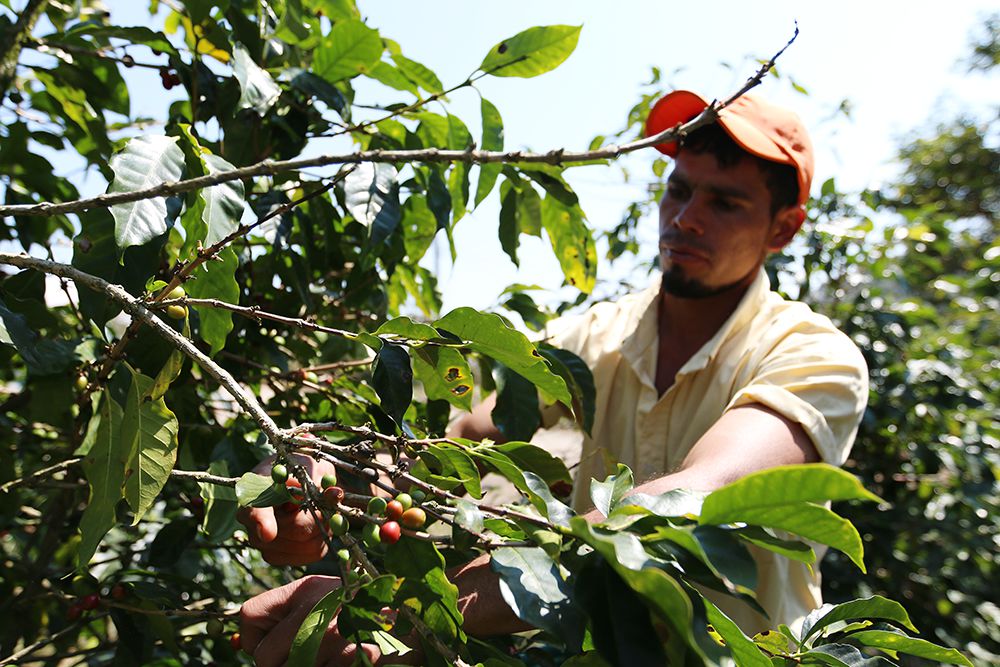I learned more about the vicious circle of poverty on my second day in Honduras with Unbound. I’m one of four Catholic journalists they’ve brought to a rural area of this Central American country to learn more about the struggles people face and how Unbound helps.
Alexander, who has two children sponsored through Unbound, took time to show me a little about harvesting coffee. We went to field where he picked coffee cherries. Then he showed me the process of how the cherries are hulled before they are roasted.
In this part of Honduras, you can pick coffee for around three months, from sometime in December to March. Coffee harvesters get paid by the pound. Alexander, on a good day, can harvest more than most, he says. Upwards of 200 pounds if the cherries are thick on the coffee plants. For 200 pounds of picked coffee in a day, he gets a little over $10 US.
I first heard these figures a few years ago when I did some reporting on a coffee co-op called Café Justo. But it’s still astonishing. In the U.S., some folks pay more than $10 for one pound of coffee, and here’s Alexander getting paid $10 for 200 pounds. Sure, these aren’t exact figures and there are other factors, but you get the picture.
As we were talking, another coffee harvester walked up with his day's take. That’s Hector and he’s hoisting a 130-pound bag of coffee on his back — he doesn’t look like he weighs much more than 130 pounds himself!
I asked why they did it for so little, and they said there wasn’t much of a choice. They need work. When laborers are so desperate for work, companies don’t seem to consider just wages. Alexander said many coffee companies buy their beans from this field. The coffee plants go clear up the face of the mountain cliff.
Later, I had a long chat with Juan Ramon, who also has kids sponsored by Unbound. He’s a farmer — beans and corn. But he told me it’s hard to make much of a profit. He has to rent the land to farm and so gives 100 pounds of its yield in exchange for about a half a block space. That works out to be less than 10 percent of the yield. After covering the seeds, fertilizer and other costs, there isn’t much left.
“But you get your fist-fulls,” his wife, Elida, told us, meaning the family enjoys handfuls of the food from harvest.
We talked a long while. I’d heard yesterday that smugglers are charging $5,000 to take migrants to the United States. Today I heard it had gone up to $6,000. Why spend so much when you can invest it in farming? I asked.
Well, in farming it’s hard to compete with the big companies. You end up selling low because you can’t sit on your product until the price goes up. So for farmers like Juan Ramon, it sometimes makes more sense to work as a day laborer, when he can. But the problem is the lack of consistency.
I asked him if he ever considered making the dangerous journey to the United States himself. He said he had, and a lot. He told me of the many stories he’d heard of people dying along the way. Many of his co-workers made the journey already. But he would still think about it. It’s not hard to understand, when you consider a day laborer in the United States could make $100 in a day — 10 times more than they make in Honduras.
But, he said, now that he has two children sponsored through Unbound, he has a steady stream of support. Families choose what kind of support they receive and their kids have to stay in school. That’s part of the deal.
Both Elida and Ramon hope that, through education, their son and daughter won’t have to live with such financial uncertainty. Through education and support, they believe their children will lead better lives here in Honduras.

